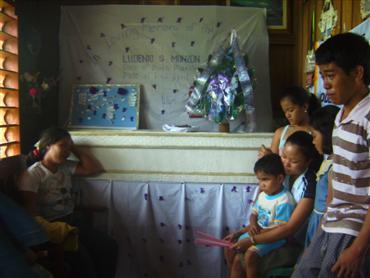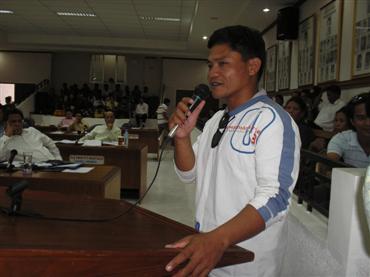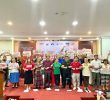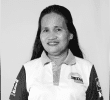In 2007, he led a barricade against the drilling operations of the mining company in Barangay Caatihan and joined mass demonstrations in Mati town months afterwards to �expose� alleged attempts of the local government to declare Boston a no-man’s land to pave way for the entry of foreign-owned mining companies in the area.
In an interview with davaotoday in March 2008, Monzon decried the effects of military operations in Boston. Monzon also helped farmers allegedly tortured by soldiers to speak out in a hearing with provincial legislative officials at the Mati capitol. They reported the harassment to the Commission on Human Rights (CHR) in the region.

Monzon’s wife and children at the wake.(contributed photo by Karapatan Southern Mindanao)
�Monzon�s death is a classic case of how legitimate dissent is being suppressed in the country, especially in indigenous peoples� communities where foreign mining companies operate,� Kerlan Fanagel, secretary-general of the indigenous peoples group Pasaka said.
The village of Caatihan lies within the 19,000 hectare ancestral domain claim of the Mandaya tribe in Boston. Eleuterio Manaytay, the municipal tribal chieftain appointed by NCIP, said the tribe secured a Certificate of Ancestral Domain Claim (CADC) in the area in 2002, 50 years after Picop, the largest pulp manufacturing company, logged over the land.
Omega Gold has been conducting exploration activities in sitio Napo, 5M of barangay Caatihan, where Monzon lived. One of the eight barangays of Boston town, Caatihan lies near the boundary of Surigao del Sur and the gold-famous Mt. Diwata of Monkayo town in Compostela Valley.
Davaotoday.com learned from Manaytay that their group won an ownership case against Picop in 2002. Two years later, the tribe entered into a so-called “stockholders’ agreement” with Omega Gold.
Monzon�s wife, Amalia, recalled how Manaytay used to call Monzon as �tinik (thorn) sa lalamunan, � an idiomatic expression referring to him as a hardcore dissenter.
Fanagel also recalled how Monzon told an assembly of Kalumaran members that the ruling tribal council in their village was making his work very difficult.
�He was accepted as an �ex-officio� member of the tribal council but he was told to report the activities of their organization (Nigkomb) to the group,� Fanagel said. �Apparently they wanted to keep a close tab of what Monzon�s organizations had been doing.�
�The government, which has shown intolerance for dissent, has resorted to calling legitimate dissent as rebellion,� Fanagel said. �Once accused (of being a Communist sympathizer), one becomes a fair target. It is this frame of mind that killed Monzon,�
Fanagel pointed out how government brands organizations as �communist fronts,� making them fair targets.
Artiza said they formed the group Nigkomb primarily to protect their rights as small farmers. He said that the livelihood in the mountain villages of Boston mainly consisted of selling logs. The area still forms part of the CADC, which maintains a five-year permit with the Department of Environment and Natural Resources (DENR) for the community based-forest management agreement (CBFM).

Ludenio Monzon at the Davao Oriental provincial capitol Sangguniang Panlalawigan session on February 12 last year, appealing for a stop to the military operations by the 67th and the 72nd Infantry Battalions of the Philippine Army. Monzon said livelihood activities of people came to a halt.(davaotoday.com photo by Barry Ohaylan)
The CBFM allows regulated cutting of trees by villagers. The NCIP-appointed members of the tribal council are given the legal rights to regulate such activities.
�If the farmers do not have work in their farm, they cut down trees to sell. When they have something to sell, they turn to the organization for help. Being the chairperson of our organization, Monzon acts as the negotiator with the local compradores, in behalf of small farmers,� Artiza explained.
Monzon kept doing this work even after he knew he was already in the Order of Battle list of the military. �That day he came to Boston, he was to meet a person from another village who had asked help for the scaling of some logs,� Artiza said. �May was supposed to be a busy month for us.�
They were supposed to meet up with small farmers of Kilometer 55 to demand for an increase in the buying price of logs from mining tunnel owners.
On May 6, activists from different parts of Southern Mindanao went to Boston to pay homage to the man they considered a hero.
�He was a poor man with such great principles,� the 73-year old lumad leader Monico Cayog remembered Monzon in a special tribute. �He remained true to what it is to be a lumad: to stand for the protection of ancestral land from foreign entities who are out to rob the future of our descendants.
To express their yearning for justice, Monzon�s family put a young chicken in his grave. In the Mandaya tradition, this ritual is meant to disturb the perpetrators� conscience. (Cheryll Fiel/davaotoday.com)
extrajudicial killings, Extrajudicial Killings, human rights violation, Military









